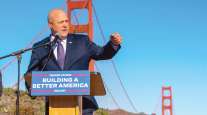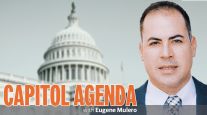Editorial: A $27 Billion Traffic Jam
Here’s a double-barreled dose of worrisome news: Trucking wasted some $27 billion in fuel and lost productivity during 2011 due to congestion in the nation’s largest urban areas; fuel prices spiked in the most recent survey by the Department of Energy, 9.5 cents a gallon for diesel and 18.1 cents for gasoline.
In other words, count on that $27 billion figure cited in a new study by Texas A&M’s Transportation Institute going even higher in coming years, as fuel prices climb.
The study provides additional testimony on why it’s important for the United States to spend more money expanding and repairing its transportation infrastructure. And that means that Congress and the White House have to agree on how to pay for that vital road and bridge work.
The $27 billion in wasted time and fuel eventually came out of consumers’ pockets in the form of higher prices. Congress needs to weigh that hidden cost against the potential political pain that might result from doing the right thing: namely, raising the federal fuel tax, and also indexing the tax to prevent erosion in the value of the tax over time.
We’ve been beating this drum for years, but there’s been precious little action coming from Capitol Hill.
Perhaps this new report will give Rep. Bill Shuster (R-Pa.), the rookie chairman of the House Transportation and Infrastructure Committee, even more ammunition as he talks with his colleagues about how to fund the nation’s infrastructure.
As Transport Topics reported recently, Shuster has said he’s open to all ideas about how to raise the necessary revenue to get the job done.
We also cited a report by the American Society of Civil Engineers that the nation would gain $3.1 trillion in expanded gross domestic product over the next years — if we spend $157 billion on improving our infrastructure.
Now Texas A&M shows us that, as a nation, we wasted $121 billion due to traffic congestion during 2011, of which trucking paid 22%, or $27 billion.
As that famous ad slogan went: “Pay me now or pay me later.”
We think the nation would be better served by a government that takes the bold steps and oversees a reinvigorating of what has been the world’s greatest transportation infrastructure.
The time is now.




